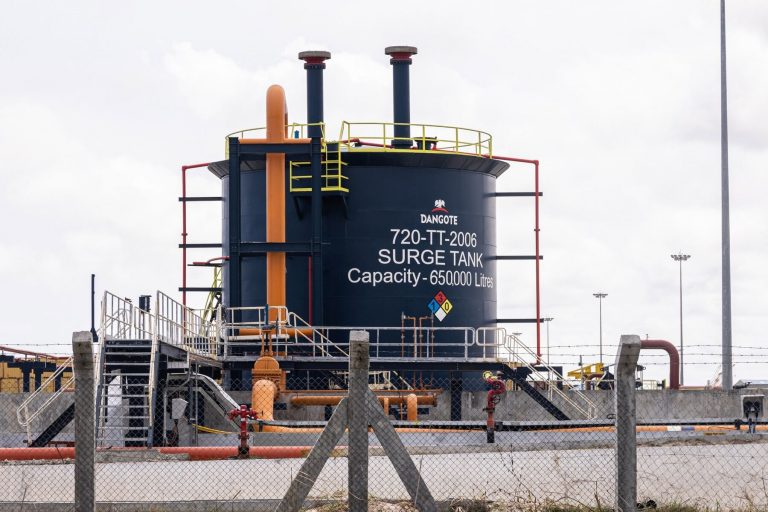
The federal government of Nigeria has announced that petroleum marketers can now directly purchase products from the Dangote Refinery, following weeks of pricing controversy.
This decision, reached during a technical committee meeting headed by the Minister of Finance and Coordinating Minister of the Economy, Mr. Wale Edun, marks a major shift in the nation’s downstream petroleum market, which has long been dominated by the Nigerian National Petroleum Company Limited (NNPCL).
This new arrangement brings an end to the exclusive monopoly the NNPCL held as the sole off-taker of petroleum products from the Dangote Refinery. The government is optimistic that this move will foster competition, stabilize fuel supply, and potentially lower prices at the pump.
Tekedia Mini-MBA edition 16 (Feb 10 – May 3, 2025) opens registrations; register today for early bird discounts.
Tekedia AI in Business Masterclass opens registrations here.
Join Tekedia Capital Syndicate and invest in Africa’s finest startups here.
In his statement, Mr. Wale Edun stated that this shift is part of a broader strategy to deregulate the petroleum market.
“This direct purchasing mechanism allows marketers to negotiate commercial terms directly with the refineries, fostering a more competitive market environment and enabling a smoother supply chain for petroleum products,” Edun said.
The minister added that with local production now coming online, the market is better equipped to support these direct transactions, enhancing efficiency and stabilizing prices.
Furthermore, the transition to a Naira-based sales mechanism was highlighted as a key component of the government’s broader economic strategy. The policy is aimed at insulating the market from foreign exchange fluctuations and reducing the country’s reliance on foreign currency for fuel imports.
Background of The Pricing Controversy
The decision comes after months of controversy and tension between the Dangote Refinery, independent marketers, and the NNPCL over fuel pricing. Since the commencement of operations at the Dangote Refinery, independent marketers had been effectively shut out of the supply chain, as the NNPCL maintained a monopoly over the purchase and distribution of petroleum products. This situation was exacerbated by the opaque pricing structure employed by the NNPCL, which left marketers frustrated and the general public facing high and fluctuating fuel prices.
At the heart of the issue was the price at which Dangote’s products would be sold. While the NNPCL and the refinery were locked in negotiations over pricing, independent marketers were left with no access to the refinery’s output. There were concerns that the NNPCL was inflating prices to cover costs, as it controlled both the supply and distribution networks. As a result, independent marketers found themselves sidelined, relying on imports for supply.
The lack of clarity regarding pricing from the Dangote Refinery also fueled speculations, with some suggesting that the refinery might sell petrol at up to N1,000 per liter. This speculation, though unconfirmed, created anxiety across the market. Marketers expressed concerns that NNPCL’s control over the distribution could artificially raise prices, further squeezing their already thin margins.
New Government Directive: A Path to Full Deregulation
For years, Nigeria’s downstream sector has been mired in inefficiency, with a heavy reliance on imported fuel despite the country being one of the world’s largest crude oil producers. The Dangote Refinery has been heralded as a potential game-changer, with the capacity to meet a significant portion of the country’s fuel needs.
Now, with this new government directive, the hope is that local production can not only meet domestic demand but also do so in a way that promotes competition and transparency in pricing.
The move is expected to lead to a more competitive pricing structure. With independent marketers gaining access to the refinery’s output, competition is likely to drive prices down. There are already signs of this trend emerging: reports have surfaced that some petrol stations, especially those operated by independent marketers, are offering lower prices than NNPCL-controlled outlets.
This competition is expected to intensify as more marketers enter the supply chain directly from the Dangote Refinery, which could ultimately benefit the end consumer.
However, while this development has been welcomed by many in the industry, there is also skepticism about how well the transition will be managed. The Nigerian fuel market has a long history of regulatory inconsistencies, infrastructural challenges, and corruption. There are concerns that while the government is pushing for full deregulation, issues such as insufficient fuel supply from the refinery, distribution logistics, and regulatory bottlenecks could hamper the expected benefits.
Moreover, Nigeria’s fuel market remains susceptible to global trends, and while domestic production at the Dangote Refinery offers a buffer, it does not completely shield the market from external shocks. This means that prices could go higher or lower than they are. Many believe that this trend will be determined if fuel subsidies are totally removed and the downstream sector fully deregulated.
However, Edun reassured stakeholders that the government would continue to provide clarity and support throughout the process, engaging with industry players to iron out any issues that arise.
“We are committed to providing clarity on this development and will continue to engage with stakeholders to ensure a seamless transition process,” Edun said.



